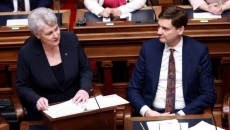A final report into missing children and unmarked graves at residential schools is calling on the federal government to create an Indigenous-led national commission with a 20-year mandate to investigate missing and disappeared Indigenous children.
It's also calling on Canada to refer itself to the International Criminal Court for investigation.
Kimberly Murray, Canada's special interlocutor on unmarked graves, released her final report Tuesday in Gatineau, Que., during a gathering with Indigenous residential school survivors and experts from across the country.
More than 150,000 Indigenous children were forced to attend residential schools, the last of which closed in 1996. An estimated 6,000 children died in the schools, though experts say the actual number could be much higher.
Many of their families were never informed of their deaths or told where they were buried. In recent years, communities have been searching the grounds of former residential schools in hopes of bringing their missing children home.
"Canada has legal and moral obligations to ensure that a full investigation is conducted into the disappearances and deaths of these children," said Murray, who is a member of the Mohawk community Kanehsatà:ke, near Montreal.
"It fulfils a highly personal, yet universal human need to know what happened to deceased loved ones and to mourn, bury and memorialize them according to the laws, spiritual beliefs and practices of one's own culture."
Murray discussed her work sitting on a stage behind an empty chair meant to honour and remember children who never made it home from residential schools. Behind her sat a collection of cradle boards dating back to 1860, which she says are "the heart of reconciliation, representing hope and life, and they serve to remind us why we are here today: for the children."
She said the national commission must reflect Indigenous Peoples' sovereignty, be governed by Indigenous laws and examine the systemic patterns of genocide and crimes against humanity. Its mandate should be no less than 20 years.
In an interim report last year, Murray documented attacks from denialists on communities exploring possible discoveries of unmarked graves.
"It's so traumatizing for survivors to say that residential schools were good things, that no bad things happened there," Murray said in an interview.
"(Survivors are) in the process now of telling their truth, of trying to find these children that were missing and disappeared, and they don't need this extra victimization and traumatization directed at them."
Her final report comes after two years of engagement with survivors and Indigenous communities across Canada.
Her office says it lays out the need for Canada to address legislative and structural gaps that exist in identifying, protecting and commemorating missing and disappeared children and their burials."
The two-volume report lists 42 "obligations" for governments, churches and other institutions to achieve truth, accountability, justice and reconciliation.
Murray said she's calling them "obligations" rather than recommendations because the government often ignores the latter. By calling them obligations, Murray says the federal government will need to recognize its role in righting wrongs.
Among them are a call for Canada to refer the disappearance of children from residential schools as a crime against humanity to the International Criminal Court.
Other obligations include stable, long-term and flexible funding for searches, full reparations and compensation for families or descendants of missing children, and the return of land associated with former residential schools and cemeteries back to Indigenous Peoples.
Murray also said the federal government should criminalize residential school denialism, or the twisting, misrepresenting and distorting of basic facts about residential schools to shake public confidence in the stories of survivors, as defined by historian Sean Carleton.
NDP MP Leah Gazan introduced a private member's bill in the House of Commons ahead of the National Day for Truth and Reconciliation that seeks to criminalize residential school denialism.
Justice Minister Arif Virani said Tuesday he's had discussions with Gazan about it, and that he looks forward to continue speaking with her after he has a chance to review Murray's final reports.
"There's no desire to ignore any aspect of what she is suggesting," Virani said of Murray's call to criminalize denialism.
He said hearing survivors and their descendants speak was moving, and that as a parent, their stories left a mark on him.
"You can't hear stories about children, about people being abused, young girls being impregnated and then (having) their babies being taken away and incinerated, and not have a response."
In a statement, a spokesperson for Crown-Indigenous Relations Minister Gary Anandasangaree said they thank Murray for her work, and that the "atrocities" committed in the schools against Indigenous children have had lasting effects.
"The voices and truths of survivors are sacred," said Gregory Frame.
"We will take the time to review the four volumes of the report."
Murray told those in attendance at the gathering that she remains hopeful about the future, and offered words of encouragement for those who will continue with this work.
"Don't lose your languages. Don't let the ceremonies die," Murray said.
"Be strong as you continue to tell your truth. Be strong as you continue to fight."






